We came together as OffChain Luxembourg because we want to contribute to the prosperity and well-being of the greatest number.
We aim to do so by facilitating value-creating human interactions, both economic and social.
We believe that collaboration and fairness are essential principles to achieve success in our efforts.
Fruitful collaboration in turn hinges on fair and competent decision making.
We believe competent decision-making depends on
a.morals and integrity first and foremost,
b.knowledge, and
c. sound and timely thinking.
" ... in looking for people to hire, you look for three qualities: integrity, intelligence, and energy. And if you don’t have the first, the other two will kill you."
Warren Buffett
We also believe competent decision-making involves trade-offs and compromises and require the establishment and general acceptance of hierarchical structures.
We also know humans are complex, and that while love, altruism, generosity, and enthusiasm are human, so are envy, greed, selfishness, and laziness.
We believe the sustainability of any organization depends on its capacity to adapt, notably by being able to record and assess the result of its decision-making in the light of its principles and objectives, and changing its hierarchical structures in order to maximize principle-based outcomes.
We believe technological progress, especially “blockchain” / “crypto-asset”/ “Web3” technology make viable new organizational structures which were not economically viable previously.
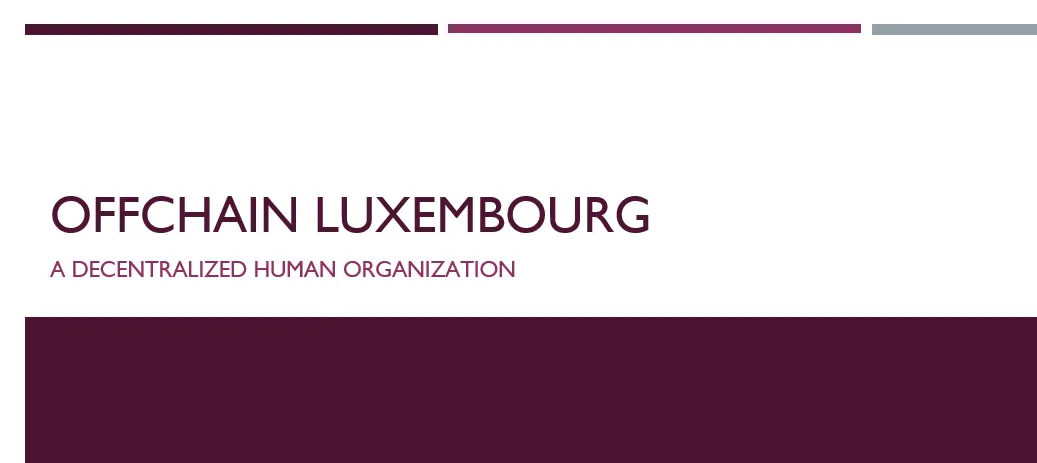
As has been written extensively in the past, Bitcoin, Ethereum and other cryptos have demonstrated that, with the help of blockchain technology, humans can come together in large numbers and achieve great results even outside the coercive frame of the law.
Yet crypto has generated much controversy. Some, perhaps most of it could be ignored as biased and self-serving defense reflexes from the "ancient world order" that felt threatened. But at some point even respected names from the technology domain, people who can hardly be suspected of defending the incumbents, have expressed concerns about the sharpest practices observed in the cryptoverse.
The evolution of the role of "crypto / Web3" in today's society has reached a major juncture: partly echoing those widespread concerns about the "darker sides" of the crypto movement, the European Union has enacted legislation that "extends a hand" to a generally defiant "cryptoverse".
Yet it belongs to us to grasp that hand and try to "build a bridge" between the world of laws, on one side, and the world of bitcoin and cryptocurrencies on the other side, two worlds that "a river" separates.
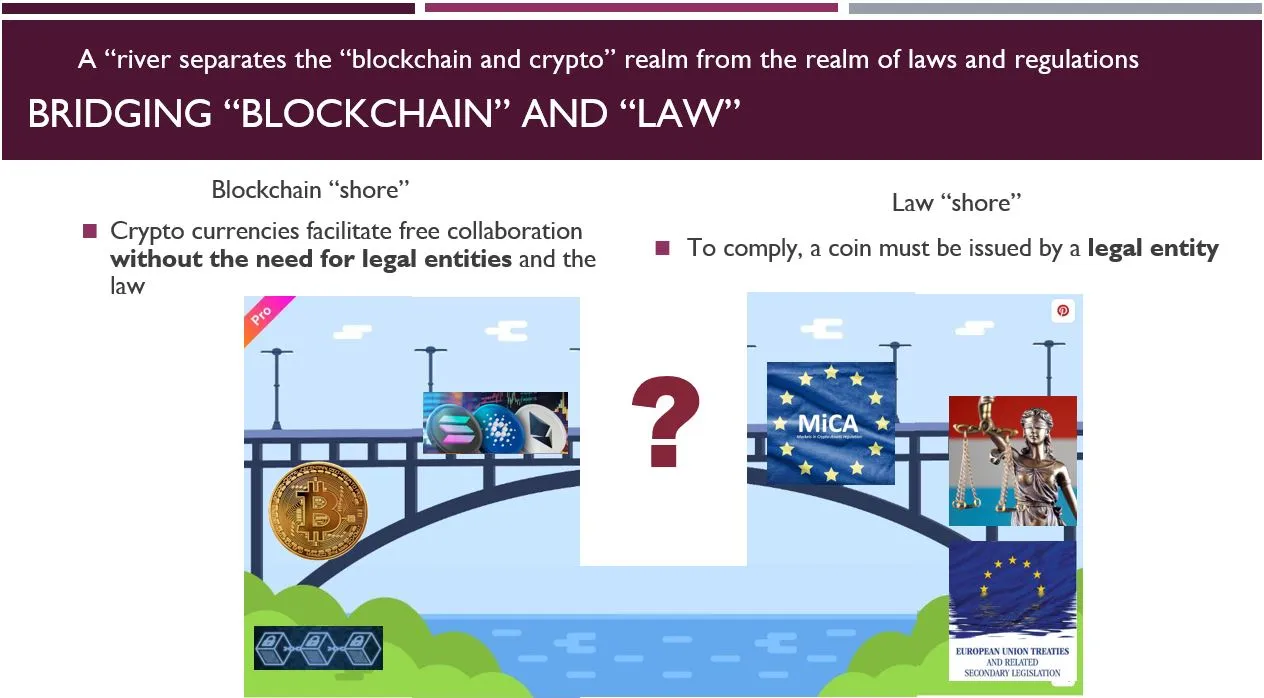
I've argued repeatedly that the weakest spot of today's cryptoverse is the absence of personal responsibility.
The "fathers of crypto", from Tim May to Wei Dai and Satoshi knew that the powers-that-be were not going to let a nimbler challenger to the Leviathan grow unhindered. They knew the States would do to any attempt at creating a non-state currency what Herod did when presented with the prophecy: nip it in the bud.
Their response was to embed anonymity / pseudonimity in the design of Bitcoin, the intellectual ancestor of the cryptoverse.
 The first paper Satoshi quotes in his seminal Bitcoin whitepaper is Wei Dai's "b-money": http://www.weidai.com/bmoney.txt
The first paper Satoshi quotes in his seminal Bitcoin whitepaper is Wei Dai's "b-money": http://www.weidai.com/bmoney.txt
However, with the "threat of violence" absent, there was little to suppress the natural propensity of people to sometimes be envious, greedy, selfish, lazy or even downright evil.
Tim May, the author of the crypto-anarchist manifesto which Wei Dai refers to above, realized that. In that seminal paper he was writing:
"Reputations will be of central importance, far more important in dealings than even the credit ratings of today."
Timothy C. May
 The 1988 Crypto Anarchist Manifesto of Tim May
The 1988 Crypto Anarchist Manifesto of Tim May
Today, Bitcoin is the uncontested number 1 crypto asset. It cannot be challenged, as a recent scientific paper has recently established: not even a state-level actor can by now destroy the Bitcoin network.
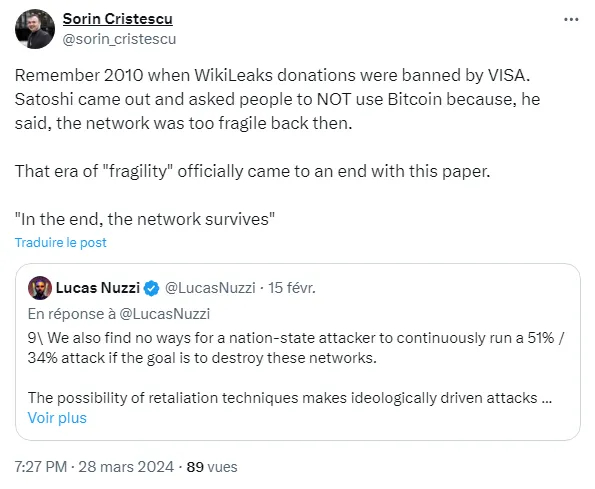 "Breaking BFT: Quantifying the Cost to Attack Bitcoin and Ethereum"
"Breaking BFT: Quantifying the Cost to Attack Bitcoin and Ethereum"
However, when observed from the angle of the Crypto Anarchist manifesto, Bitcoin has a blind spot: dealings in Bitcoin are not designed to accommodate or build reputations. Quite the contrary, Bitcoin has been designed to provide anonymity and hamper (as much as remained practical) the possibility of attaching a "reputation" score to a transaction. While we know that that is nevertheless possible through the use of sophisticated chain analysis, it's a far cry from what Tim May was pointing at: reputation as a fundamental system primitive.
The structural unsuitabilityof the Bitcoin architecture to support Tim May's reputation system is one of the reasons I repeatedly said "Bitcoin needs the cryptoverse".
OffChain Global is an unincorporated association whose goal is of building a meaningful community that connects participants with both virtual and in-person interaction. Started modestly as "Crypto Drinks" in the bull run of 2017, it is now:
"a global community for Web3 professionals and enthusiasts that’s essence is derived from meetups. Consistent meetups provide energy to the entire global ecosystem and help to ignite the online community locally, and subsequently, globally, building a community of trusted members not found in traditional online crypto communities. (Offline to Online) The industry is one of the most globally and virtually connected in the world, and our community needs to align to serve our members in a meaningful way. "
Basic Guidelines for OffChain Chapters
In-person interaction means that participants are not anonymous and can potentially be threatened by the State. Such a community could not survive against an adversarial State. This is why it can be said that it owes its existence to Bitcoin's victory.

We have decided to create OffChain Luxembourg in order to build the last portion of the "bridge" between the world of Bitcoin and the cryptoverse and the world of laws and regulations. As I was explaining in a post from about a month ago, a common concrete goal helped us focus:
"Create the 1st MiCA-compliant token in Luxembourg"
This has several implications, starting with the need to incorporate a legal entity. We did so on May 4th, registering our articles of association at the Luxembourg Régistre des Commerces et des Sociétés (RCS) (the "law shore") while also publishing them on the Hive blockchain (the "blockchain shore")
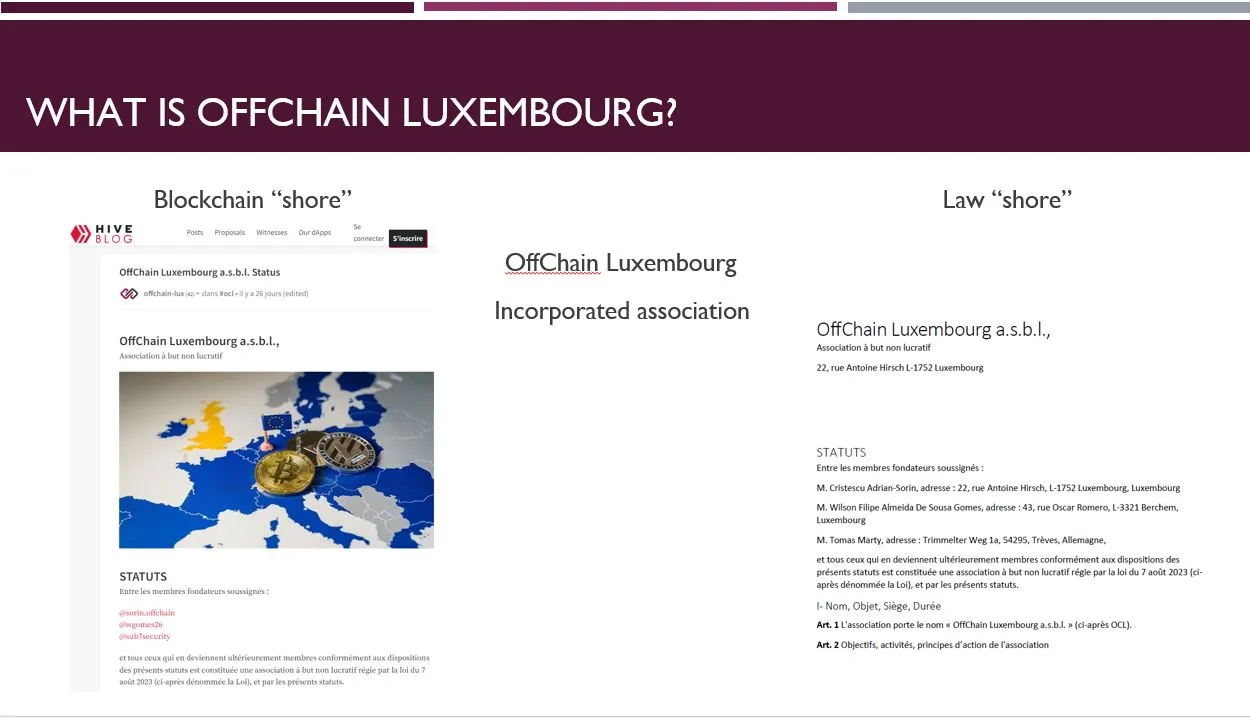 Hive blog post on the left, word document submitted to the legal authorities on the right
Hive blog post on the left, word document submitted to the legal authorities on the right
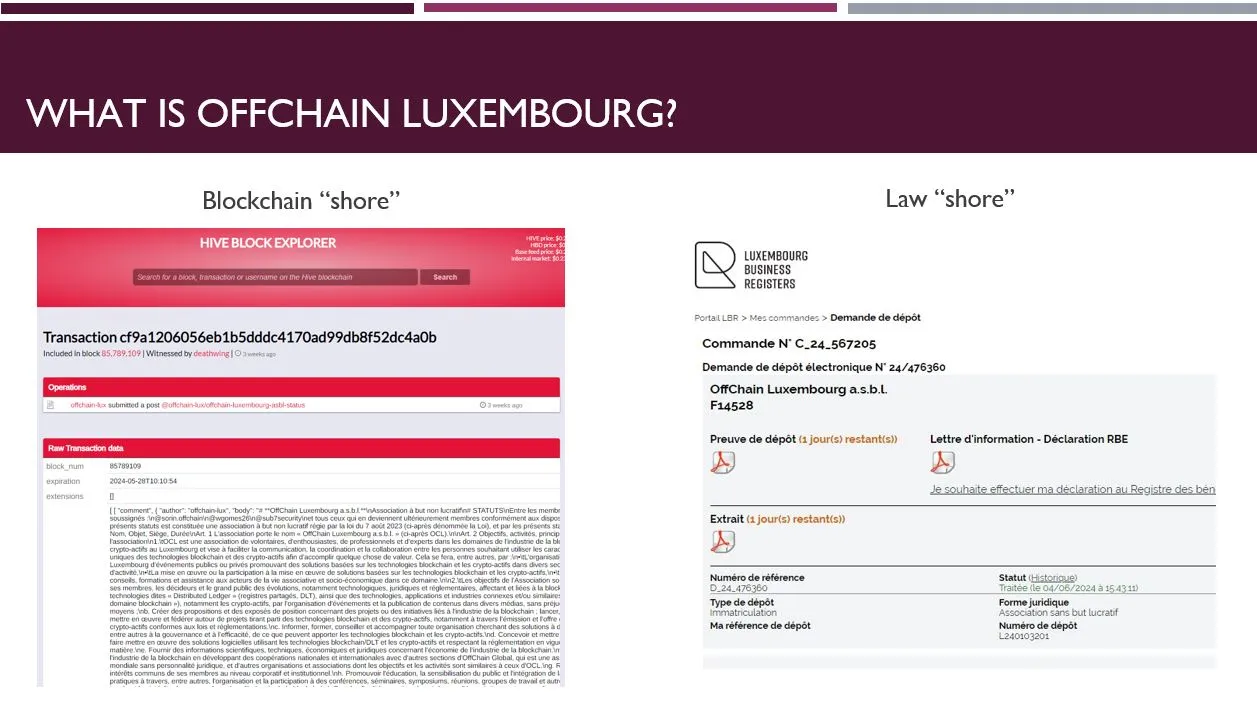 Blockchain transaction in the block on the left, the Luxembourg RCS order on the right
Blockchain transaction in the block on the left, the Luxembourg RCS order on the right
In more detail, here is what one can find on each of the "shores":
| A decentralized organization built around voluntary, uncoerced collaboration, that is tokenised and bankless | A law-abiding Luxembourg non-profit association with a centralized "Board of Directors" and "articles of associations" |
|---|---|
| An innovative governance model that uses weighted voting and teams called "nodes" with both decision-making power and financial autonomy | An official registration at entry F 14528 in the Luxembourg Business Register which also makes publicly available our articles of association |
| A proudly transparent organisation, where both decisions and financial dealings are publicly visible thanks to the blockchain | A registration in the national "legal entities directory" and of the non-profit equivalent of "ultimate beneficiary owners" (directors). |
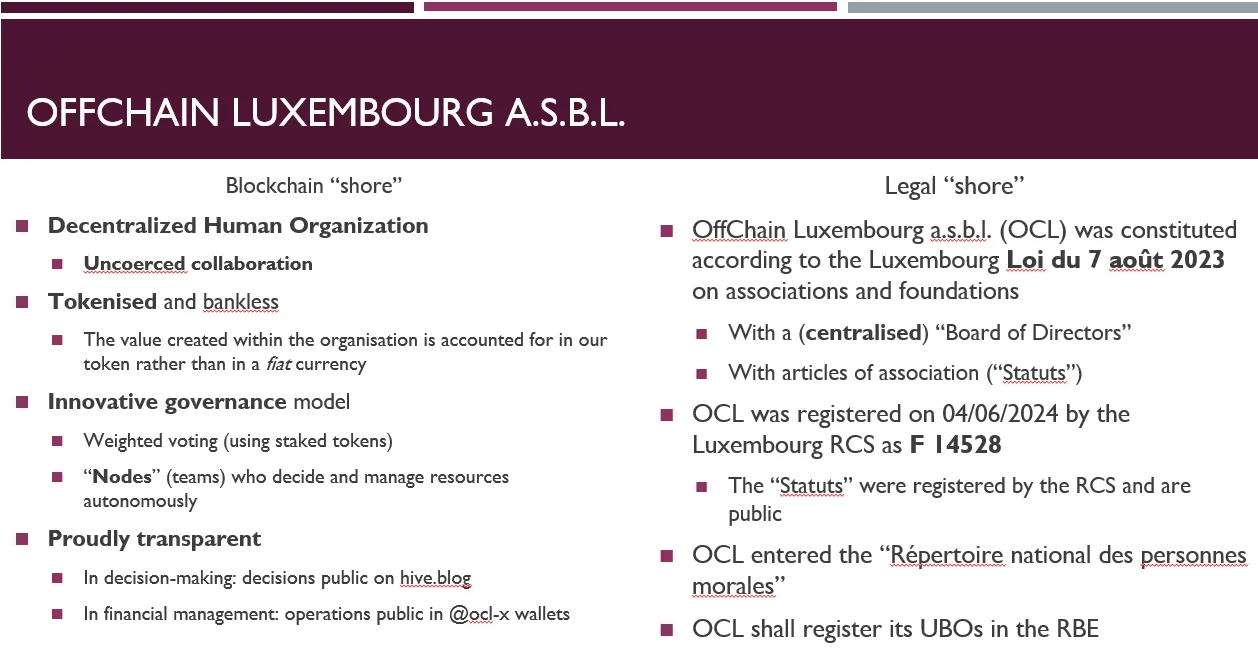
We believe we'll succeed in facilitating new, value-creating economic and social interactions if we eschew fiat money and use instead our own token for accounting.
The success of our token will thus depend on the additional value we'll manage to generate as a community.

OffChain Luxembourg started on Hive and uses this blockchain both for recording decisions and as an accounting ledger. Hive blockchain has some compelling advantages over most other blockchain systems. But in the spirit of collaboration, we are gladly welcoming extending the experiment of a "tokenised, decentralized human organization" to as many blockchains as they deem themselves competitive.
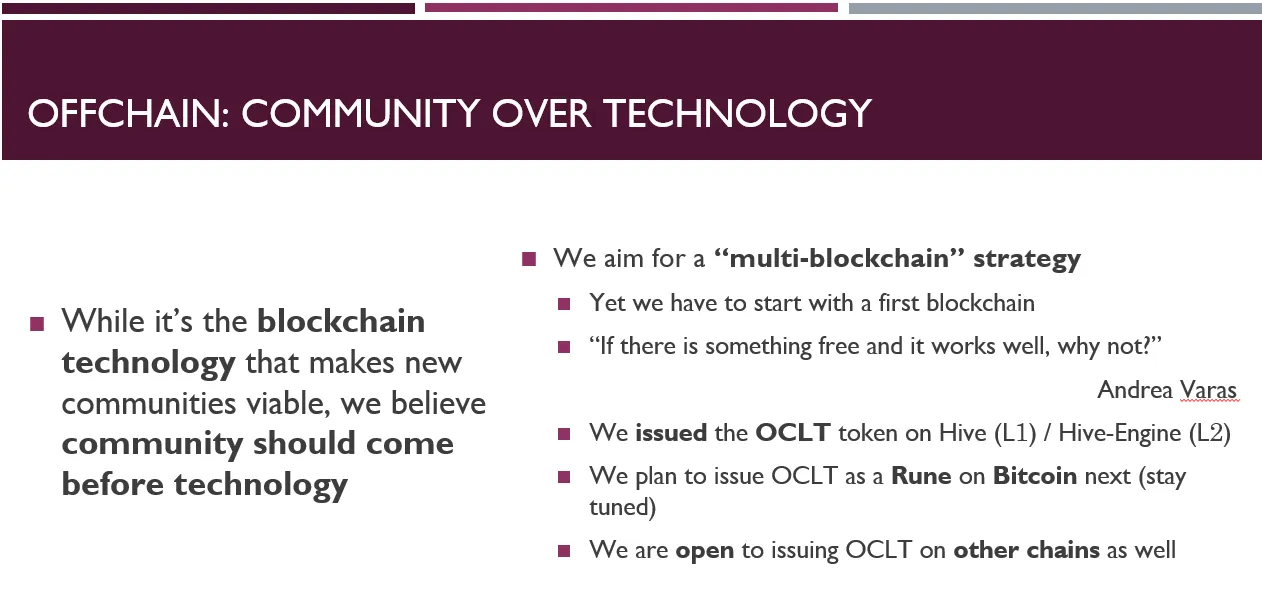
For those who do not know Hive, here is a highlight of its most relevant features:

The fair question that arises when reading all of the above is, naturally, "why is a token needed at all?" Also, a more technical follow-up: "is OCLT it a utility token?"
The following two slide below summarize the reasoning behind OCLT, which is intendend as true currency, the currency of a "virtual country", a sort of "crypto nation state", with a population - the members of the association - but no territory.
Unlike pure online communities which are global, OffChain Luxembourg aims to stay true to the OffChain Global ethos of joining online with offline by focusing on being local. Our target "locale" is the "Grande Region", centered around Luxembourg but including the French Meuse and Moselle, the Belgian Luxembourg region, Rheinland-Pfalz and Saarland in neighbouring Germany. An real economic zone with a total population of about 7.5 Million people and an annual GDP in excess of 300 Bln euro.
Our community ambitions to bring together 100 000 people, or less than 1,5% of the Grande Région's total population, and generate an additional economic value of around 100 Million to 1 Bln euro-equivalent.

While the OCLT economics is bound to evolve, it begins with a simple yet sound, proven basis. Its circulation shall be guided by the "quantity theory of money", said to have been first formulated by Copernicus and be today "the oldest surviving economic theory."
OCLT is also deliberately positioning itself as "bad money" in Gresham's terms, to the euro, which is "good money". "Bad money" is understood as money which is earned more easily and spent more easily, has higher velocity and lower cost of opportunity compared to "good money".
As such, meek OCLT is expected to encourage productive interactions, some of which are bound to be new. Interactions which would not have happened with euros as the only monetary alternative, because of the friction / transaction costs (in the largest sense) and opportunity costs of the single currency, nor in the absence of any monetary compensation.
Let's look at this claim in more detail.
Our assumption is that the euro is too strong a currency for this additional economic and social activity to happen today. Altruistic activity with no monetary counterpart on the other hand, while valuable, is less consistent, less predictable and ultimately less sustainable.
Euro-mediated transactions have costs and induce frictions due to the need for intermediaries such as banks and payment processors. Moreover, by its strength and versatility, the euro carries opportunity costs - people have a higher tendency to refrain from spending euros because they have so many uses, one of which may prove more appropriate at a future date.
In contrast, unpaid effort is relatively fickle - a significant amount exists and is appreciated, but it's usually hard to predict when someone will accept to perform a valuable action without compensation. As a consequence, some actions that would have been done altruistically are not even requested, also because of a well-researched psychological characteristic of living creatures, from cockroaches to humans, called "learned helplessness"

One of the first big hurdles facing OCLT is its widespread acceptance as a medium of exchange.
It's a hurdle no true cryptocurrency, including Bitcoin, has managed to overcome yet.
We believe that by staying local rather than global, relying on the legal framework thus meaningfully giving a role to reputation, and introducing a strong social dimension by being a non-profit with clear values, a mission and vision, we are entitled to optimism.
In the end, success will rely on far more than technology. It will take sound economics, but also deft legal skills and, not in the least, a dollop of human psychology. Humans are known to more readily take the direction of "light", of luminous, attractive perspectives.
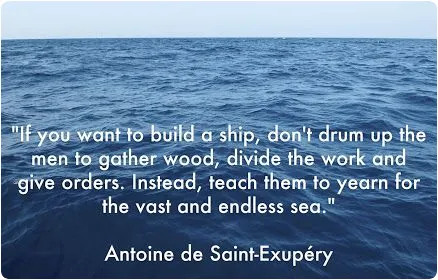
This is why we like to dream of what success might lead all of us to.
